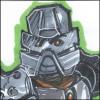Specifically, with regards to the gender imbalance in modern media:
I'd like to see a story where, during the writing process, the characters are completely fleshed out and developed. Genders would be assigned at random at the end by computer generation, so as to avoid any unwanted author-based prejudices.
Obviously this example refers to a book, but the same process could go for anything.
(I was going to say more, but I think this pretty much speaks for itself.)
-
 7
7



8 Comments
Recommended Comments